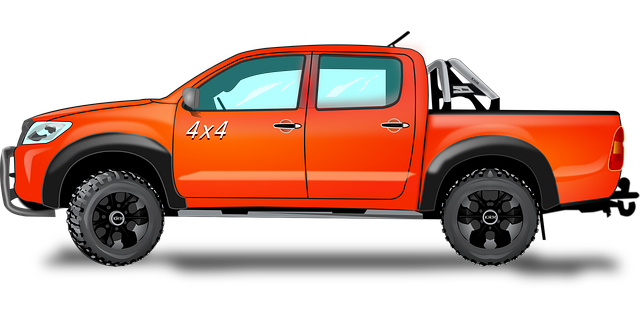- Understanding ABS Sensors: The Core Components and Their Role in 4×4 Vehicles
- – Definition and basic functionality of ABS (Anti-lock Braking System) sensors.
- – Importance of ABS sensors in improving braking performance and safety, especially in challenging terrains like 4×4 driving.
Understanding ABS Sensors: The Core Components and Their Role in 4×4 Vehicles

ABS sensors are an indispensable component in modern 4×4 vehicles, ensuring optimal vehicle stability and safety during critical driving conditions. These advanced sensors form the backbone of the Anti-lock Braking System (ABS), a sophisticated technology designed to prevent wheels from locking up when braking suddenly or on slippery surfaces. By continuously monitoring wheel speed, ABS sensors detect any individual wheel that is skidding and promptly adjust brake pressure to maintain control and minimize stopping distances.
Expert on 4×4 McCallen emphasizes the critical role of these sensors in enhancing driver confidence and overall vehicle performance. The core components of an ABS sensor typically include a magnetorheological fluid (MRF) or electronic components that work together to generate precise signals. These signals are then transmitted to the vehicle’s control unit, which responds by modulating brake pressure to prevent wheel lockup. This real-time feedback loop ensures enhanced traction and stability, making 4×4 vehicles more agile and safer in challenging terrain.
– Definition and basic functionality of ABS (Anti-lock Braking System) sensors.

The Anti-lock Braking System (ABS) is a critical safety feature in modern vehicles, especially on 4x4s like the expert on 4×4 McAllen drivers rely on. ABS sensors are an integral part of this system, designed to monitor wheel speed and detect when a wheel is locking up during hard braking. When a sensor detects a potential lockup, it sends signals to the vehicle’s electronic control unit (ECU), which then adjusts brake pressure to prevent wheels from locking up and maintaining steering control. This ensures maximum friction between brakes and wheels, allowing for precise and effective stopping even in challenging conditions.
ABS sensors are strategically placed near each wheel hub or brake caliper, providing real-time data on wheel speed. These sensors utilize advanced technology, often including magnetic or optical sensors, to accurately measure the rotational speed of each wheel. By comparing the speeds of all four wheels, the ABS system can quickly identify any discrepancies that might indicate a locking wheel. This instant feedback enables the ECU to make rapid adjustments, ensuring each wheel receives the optimal amount of brake pressure for safe and controlled stopping.
– Importance of ABS sensors in improving braking performance and safety, especially in challenging terrains like 4×4 driving.

ABS sensors play a pivotal role in enhancing braking performance and safety, especially for vehicles designed for challenging terrains like 4×4 driving. These sensors, an expert on 4×4 McCallen would attest, are crucial components in modern automotive systems. By rapidly detecting wheel speed variations, ABS sensors enable precise control of brake application, preventing wheel lockup during heavy braking or when navigating treacherous 4×4 landscapes. This not only improves stopping distances but also allows drivers to maintain better control over their vehicles, enhancing overall safety and stability.
In the dynamic and unpredictable nature of 4×4 driving, where terrain can change abruptly, ABS sensors provide a critical safety net. They help prevent skidding and loss of control, ensuring that drivers can navigate through mud, snow, or gravel with enhanced confidence. An expert in 4×4 technology would emphasize that this technology is a game-changer for off-road enthusiasts, making their adventures safer and more enjoyable while navigating the varied and often demanding landscapes they love to explore.
ABS sensors are a vital component for any 4×4 vehicle owner, especially those from expert professionals like McAllen. By understanding their core functions and significance in improving braking performance, drivers can navigate challenging terrains with enhanced safety and confidence. These sensors play a crucial role in ensuring optimal driving experience, making them an indispensable part of modern automotive technology.



